By: Ashmar Mandou
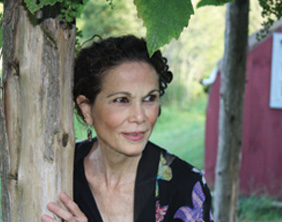
Novelist and great American literature figure Julia Alvarez, in town last Thursday to promote her latest novel, A Wedding in Haiti, shares the importance of reading and what it means to her to be a ‘real’ Latino.
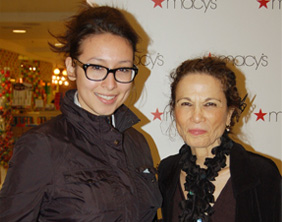
Novelist Julia Alvarez greets fans during a book signing at the Macy’s on State Street on Thursday, April 19.
Affinity to Literature
I love reading. Reading creates community and you don’t have to be the same race, you don’t have to be the same age, you don’t have to even live in the same time period. You don’t even have to believe in the same thing because you think well, church does that. All these people come together from different parts of life, but they all believe in something, they all subscribe to this faith system. Reading is just you participate in the experience of being someone else. And when you’ve done that and read a book together, all the people who have read that book, it’s like you’ve shared being that other person. Reading makes community among other things.
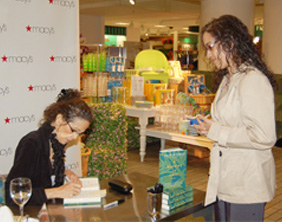
Novelist Julia Alvarez greets fans during a book signing at the Macy’s on State Street on Thursday, April 19.
First, I’m female. And you know, from working in a bicultural, bilingual environment, you know that Latino communities for all they say about machismo, which is a very real thing out there, proves we’re very strong women. It’s a very powerful, matriarchal society, entre la familia, entre la casa; the women are the deep roots. So I grew up with the men running the world outside, but the women were running the world I was experiencing at home, you know. My abuelita, my tias, my mother, I grew up in an all girl family with three sisters, so women and women’s experience was always very much a part of my life. However, when I stepped outside of the home and I was going to school before the women’s movement, before women’s studies and we read the literature that was being offered in our English and American Literature classes, they were usually by males, Anglo males, you know. I don’t totally run that down because I think when you read you can become the other and the experience of making that leap stretches your imagination and expands your sensibilities. So I got great training, but there were very few women writers, very few females that were role models and on top of that, Latino. I had great role models growing up and I had the support of my family. I was the first to receive a college education within my family. So in terms of women and role models, we need to get out there. And the way we do that is by going out there and following our own calling and proving that anything is possible.
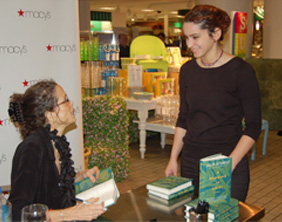
Novelist Julia Alvarez greets fans during a book signing at the Macy’s on State Street on Thursday, April 19.
You know there are all these reports and stories of what it means to be a ‘real’ Latino or Latina and I just think that starts to become dangerous. From any direction, whenever someone starts to say, you are not a real this, or you don’t do this, then I start thinking they are really narrowing down what it means to be you. If Latinos do that to each other, they are just doing what the gringos were doing to us many years ago. We are all different; we have different traditions depending on where we are coming from. Being Latino or Latina…it’s becoming truly a hybrid culture. I interviewed this Cuban girl in Miami while researching for my book, Once Upon a Quinceañera, and she chose to have a mariachi band play at her party. I was surprised because that is a Mexican tradition, so I asked her why. She simply said it was her tradition. The point is, we are sort of becoming this Pan-American culture and it’s a beautiful thing. We are taking aspects of each culture that we love and admire and making it our own. And if we don’t allow diversity, we are only hurting ourselves.
Philosophy on Life
I think a defining moment for me that I always say, is that it goes to show you that the most painful and most difficult moments of your life are also opportunities to recreate yourself. Our immigration to this country was really tough. We came here overnight, we were fleeing a dictatorship. We left everything behind, our family, our possessions, our culture, and our language. We didn’t come to a New York full of Dominicans or Mexicans, this was the 1960s. Papi couldn’t find a job, we didn’t have the right clothes, we were made fun of on the playground, we didn’t speak English, and I just thought this is the end of the world. And it was. It was the end of one world, but a new one was about to start. And I got very lucky; I had a teacher, a nun. And she got me reading, so I was learning English. Her encouragement and the process of slowly learning English, and paying attention to it became perfect training for becoming a writer. So I think that moment for me, says that when a world falls apart there’s a possibility of remaking yourself, like a rebirth.
Question submitted from Drexel School’s fifth grade class:
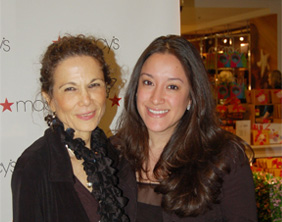
Novelist Julia Alvarez greets fans during a book signing at the Macy’s on State Street on Thursday, April 19.
That’s a difficult question. It’s hard to pick just one genre and I’m getting to that age where I don’t want to choose [laughs]. I have to say that you can’t be a writer if you are not a reader. It’s like, which came first the chicken or the egg. Without being a reader you’re not a writer. As for favorite books, I have so many of them. I have to say one that surprised me was The Hunger Games. When I write in a different genre, I make sure I read in that genre. I read it and I couldn’t put it down. What a great book. That said, I think the important thing is I am always learning and growing as a reader.
Fan Ivette Castora Gonzalez: How do you know which story to tell?
Wow. I have started so many books, I would have triple the amount of books had I finished them. Sometimes I’ve spent half a year on it, researching it and the roots don’t go down deep enough. It has to be something that intrigues you and keeps you going and surprises you. I call it, a pebble in my shoe. You get an idea or something intrigues you and you want to find out more about it and so you find out more about it and maybe that ends. Or you find out more and more and then you want to write and if it keeps pulling you that is the only way I know, that you know that it’s a book. And it’s usually nothing that you figured out…it’s usually things that you don’t really quite understand. For me, that’s what really works.












